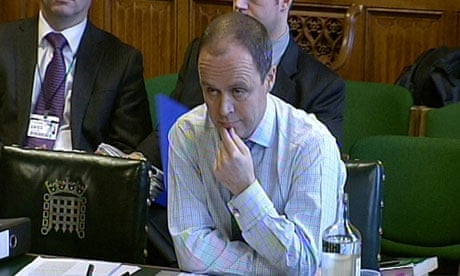The extraordinary public clash between the Metropolitan police and the director of public prosecutions during which each side has implied that the other has misled parliament continued with controversial claims before a Commons committee.
The quarrel continued as new claims were made that private investigators working for newspapers may have targeted the families of Milly Dowler, the Surrey schoolgirl who was abducted and murdered in March 2002, and of Jessica Chapman, one of the two 10-year-old girls murdered by Ian Huntley in Soham in August 2002.
The Met-DPP clash continued at a special session of the Commons culture, media and sport committee, where Scotland Yard's acting deputy commissioner, John Yates, conceded for the first time that the original 2006 inquiry into phone hacking at the News of the World should have done more, and that police had failed to do enough for victims of hacking.
Asked if he accepted that the affair had seriously damaged the reputation of the Metropolitan police, he said: "I would certainly say that it has been very challenging for us. We are working extremely hard to put that right."
But it was his evidence on the legal advice provided by the director of public prosecutions, Keir Starmer QC, that was most controversial. The immediate focus of the dispute is an arcane point of law.
Its underlying significance is the light it may shed on the question of whether Scotland Yard has tried to hide the truth about the number of people whose phones were hacked by journalists and private investigators working for the News of the World.
In his evidence, Yates listed a series of occasions on which prosecutors had advised police that the Regulation of Investigatory Powers Act 2000 (Ripa) made it an offence to intercept voicemail only if the message had not already been heard by its intended recipient.
He said this advice had been given repeatedly during the original inquiry in 2006: "It permeated every aspect of the investigative strategy." It was on this basis, Yates added, that he had previously told parliament that police had found only 10 to 12 victims of the hacking, even though the emerging evidence now suggests there were many more.
Yates's evidence directly clashes with a written submission from Starmer last October to the home affairs select committee. Starmer said the question of how to interpret Ripa had not arisen during the original inquiry.
Prosecutors had attached no significance to the point in preparing charges or presenting the facts, he said. "It is evident that the prosecution's approach to Ripa had no bearing on the charges brought against the defendants or the legal proceedings generally," he wrote.
Yates was responding to claims in the Commons this month by Chris Bryant, the Labour MP for Rhondda, that he had misled parliament with his account of the law and his claims about the number of victims in the affair. Yates then defended himself in a letter to the Guardian, quoting an earlier written submission from the DPP to the culture, media and sport committee. Starmer replied with a further letter to the Guardian saying it was "regrettable" that Yates had quoted a single sentence out of context. Yates said: "It's difficult to see how it could be taken out of context."
Yates agreed that on 1 October last year the Crown Prosecution Service had told Scotland Yard that Ripa made it an offence to intercept voicemail regardless of whether the message had already been heard by its intended recipient. "They have refreshed their view … He has changed his mind," Yates said.
"During the Mulcaire and Goodman case and throughout the ensuing period until October 2010, the legal advice on this matter was unequivocal and very prescriptive. The significance of this point is very clear. While suspects may have targeted many people, we could only actually prove the offence of voicemail interception in a very small number of cases."
The culture, media and sport committee is understood to have asked the DPP to send it written evidence on the dispute, and is considering producing a supplementary report, which would be its third on the affair. Both Yates and Bryant are expected to give evidence to the home affairs select committee on Tuesday.
The DPP declined on Thursday to respond to Yates's evidence.
The possible targeting of the families of Dowler and Chapman emerged in questioning from the Labour MP Tom Watson who suggested the Dowlers had been a victim of Steve Whittamore, a private investigator who worked for numerous Fleet Street newspapers and specialised in "blagging" confidential data from phone companies and government databases.
Watson also suggested the Chapmans had been a victim of Glenn Mulcaire, who worked for the NoW and specialised in hacking voicemail. Yates said this was the first he had heard of either claim.
The committee spent nearly an hour and a half closely questioning Yates. Paul Farrelly asked him to comment on the claim by former assistant commissioner Andy Hayman, who led the original inquiry, that they had left no stone unturned. Yates said: "It's a fairly bold statement … The experience of the last three years would suggest that in some areas perhaps more could have been done."
He acknowledged that police had not fully searched several bin bags of material seized from Mulcaire. After the Guardian revived interest in the affair in July 2009, he had arranged for a dozen officers to go through it all and put it on to a database, he said. "It was clear that we needed to do more analytical work. It was a slow process. We could have been more speedy around that."
Watson suggested that Yates had been wrong to claim there had been only a small number of victims at a time when he knew this material had still not been analysed.Yates acknowledged that police had failed to contact all potential victims. "We could have done more around victims.
He said he was not sure why police had never contacted Sienna Miller, whose lawyers have obtained evidence, held by police for four years, suggesting she and her friends and family were targeted by Mulcaire.
He declined to discuss the targeting of the former deputy prime minister John Prescott on the grounds that his case was part of the current Yard inquiry.
Yates went on to admit that police had failed to liaise properly with phone companies who used their own records to identify at least 120 victims: "I'm not sure that the follow-up on that was as thorough as it could have been."
He agreed he had dinner with the current editor of the News of the World, Colin Myler, at News International's expense shortly after he had decided that there was no reason to reopen the inquiry into the paper's involvement in crime. He said he was sure that they had not discussed the phone-hacking affair. "I just wouldn't do that."
Asked by Jim Sheridan if he thought it was appropriate that the current commissioner, Sir Paul Stephenson, had dined with the paper's deputy editor, Neil Wallis, at the height of the original inquiry, in September 2006, Yates said: "You would have to ask the commissioner."
He declined to say whether Scotland Yard had been paying for him to use the solicitors Carter-Ruck to send letters of complaint to the Guardian. "Contrary to what they may think, I have huge admiration for what the Guardian have done. It was a huge story."

